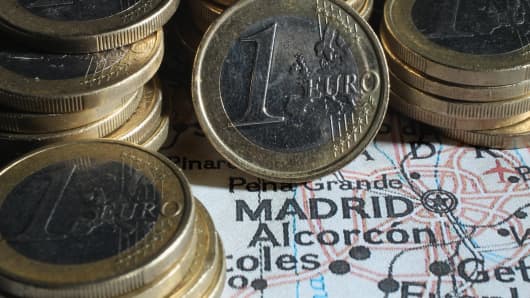At the start of Spain's fifth year of recession, there are at last reasons to believe that the worst may be over, and that the beginning of a slow recovery may not be far away.
Since 2009, the divergence between Spain and the core countries of the euro zone has been to a large extent corrected: inflation, which peaked at 4.3 percent in 2008, was negative in 2009 and is less than 3 percent today, despite sharp increases in indirect taxes; the spread in unit labor costs with respect to the euro zone average, which was 19 percent, is now 9 percent, both across the whole economy and in industry. The current account deficit, 10 percent of GDP in 2007, was less than 2 percent in 2012.
While public servants have had pay cuts of between 10 and 25 percent, cuts of 20 to 40 percent are not uncommon in the private sector. In short, Spain has regained competitiveness and is in a position to benefit from growth in her trading partners. Lastly, the restructuring of the banking system is nearly completed (partly at the cost of a higher public deficit), and de-leveraging of the banking sector is slowly proceeding (from 19 in 2007 to 16.7 in 2011)
Spain has complied with the demands of the euro zone regarding labor market reform and fiscal balance. These measures were needed to set the economy on a balanced path, and the Administration has shown enough determination to carry them through, even though it was known, despite assurances to the contrary, that their immediate effect would be negative.
And, indeed, if the deficit created by the end of the housing bubble (11.2 percent in 2009 from a surplus of 1.9 of GDP in 2007) has been reduced to a little above 9.4 percent in 2011 in the face of a falling GDP, this has been at the cost of aggravating the recession.
The price paid for the adjustment has been very high: six million unemployed, or 26 percent of the labor force, partly due to the contraction of construction, but an increasingly large number in industry, services and trade, due the credit crunch and ensuing recession and to the slump in household consumption. The destruction of economic fabric, factories, shops and businesses, has been extensive, but social unrest has so far been minimal.
Many believe, however, that, unless there is the prospect of a turnaround sometime this year, the social situation may deteriorate further. People must be offered a perspective of growth if social disruption is to be avoided.
Little can be expected from domestic sources: consumption is hampered by high household debt and high unemployment; private investment, by lack of credit; government spending, by restrictions on the deficit. These constraints will not go away, and as a result growth will likely be slow.
Sources of growth exist, however: first, a healthy export sector that has increased market share throughout the recession; of these exports, steel and chemicals make up for 26 percent of the total, followed by capital goods (20 percent) and automobiles (17 percent); food products, Spain's traditional source of foreign exchange, are now only 16 percent of the total. Second, there is a return of confidence in the stability of the Spanish economy and in the resolve to pursue reforms.
Increased confidence could result in a softening of the time-schedule of budget consolidation, so that public funds could be available to help extreme social situations. It should also result in a return of foreign investment, which would provide an alternative to domestic credit, severely constrained by the need for deleveraging.
The current situation, in which capital outflows totaled 20 percent of GDP in 2012, is clearly abnormal. In ordinary times, foreign direct investment in Spain amounts to around 10 percent of GDP per year. The measures taken so far and the speed of adjustment should help restore confidence in the stability of the Spanish business environment. Lastly, the consolidation of the banking system could open the way for a successful negotiation of Spain's private debt, a still unresolved question that is another obstacle to growth. History tells us that the end of a big bubble is always followed by some sort of debt restructuring. No exceptions seem to exist.
Much is being made by the press of the Catalan question as a source of uncertainty. This needs to be put into perspective. First, it is an old issue, which has taken different forms through the ages. In the current setting, expressions of dissatisfaction of a majority of the Catalan people against the central government range from a demand for a more equitable sharing of the federal budget to the goal of an independent Nation-state within the EU; all these demands have so far been ignored by the central government, and dialogue is proving difficult. One thing appears clear, however: even if the process is full of uncertainties and to some extent unpredictable, there is little doubt that it will unfold peacefully: a violent confrontation seems quite out of the question. And, more important from our point of view, both the Catalan and the central government will at all times preserve the rules of the game for business. The process of finding an adequate arrangement may not help growth in the short run, but it will not hinder it greatly.
In short, in 2013 Spain may start to get out of the slump. If so, it will be slow progress, but progress. A long way, but upwards.
Alfredo Pastor is a Professor of Economics and Banco Sabadell Chair of Emerging Markets at IESE Business School


